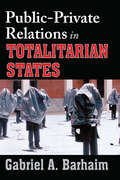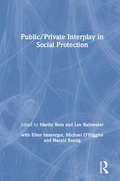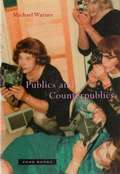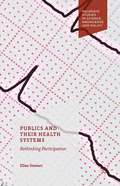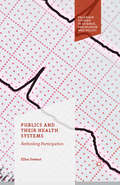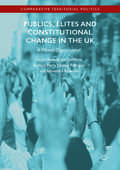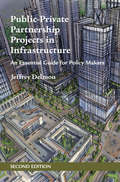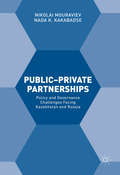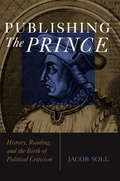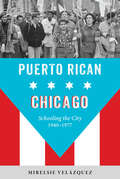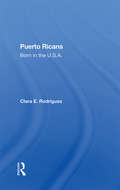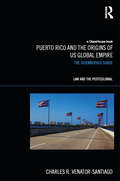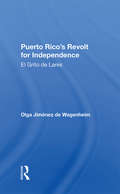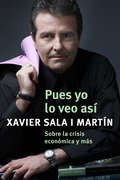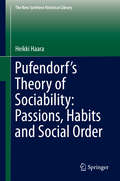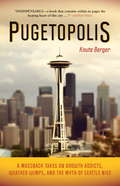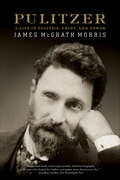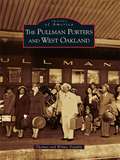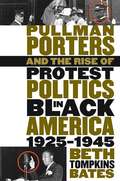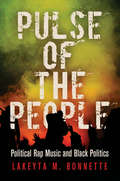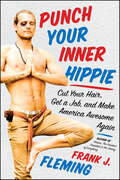- Table View
- List View
Public-private Relations in Totalitarian States
by Gabriel BarhaimThis book argues that the transition by Western society to late modernity has weakened the social order, creating a quasi-anomic state that favors those conditions that place culture in a position of prominence. The preponderance of culture over social, with its affinity for profane and its immanent nature, is posited by the author to have a major impact on the fabric of social life and its implications especially on social solidarity. Gabriel A. Barhaim employs a number of ideas and concepts to illuminate the central theme of a feeble social order. Such concepts are, among others, crisis of reference, desacralization of the social order, the predominance of individual networks as a new form of social solidarity, overpowering of the public sphere, and the reduction in authority of collective representations. The persistent crisis of the social order-strongly visible in the disappearance of major ideologies on the one hand, and in the disintegration of the state and its institutions on the other hand-has been the impetus to cultural phenomena whose prevailing themes encode the fate of individuals, both symbolically and expressively. Barhaim regards the social order as the inspiring scene of action, while culture, with its diverse modes of expressions, provides guiding commentaries. In grappling with these topics in each chapter, the analysis reveals the many facets of culture and the many symbolic forms it takes. All of this provides the necessary commentaries needed to make sense of a bewildered social life, in the context of late modernity. These commentaries should be viewed mostly as a path to understanding the pressing social arrangements, interactions, practices, of contemporary life. Three out of the eight chapters are concerned with the East-Central European experience.
Public/Private Interplay in Social Protection
by Lee Rainwater Martin ReinThis accessible introductory text discusses how people in a pluralistic society such as ours can accept a common social ethic - a publicly justified morality. It presents analyses of the basic concepts, including justifications of liberty, harm to others, private property rights, distributive justice, environmental harms, help to others and offensive behaviour. Gaus acquaints the reader with the major figures in social philosophy - John Stuart Mill, Jeremy Bentham, Thomas Hobbes, John Locke, David Hume, John Rawls, David Gauthier, and Joel Feinberg - as well as recent communitarian philosophers. The basic technical aspects of social philosophy are also introduced: game theory, social choice theory, the ideas rational action, rational bargaining, and public goods. Throughout, helpful short examples and stories are used to illustrate the material.
Publicity and the Canadian State
by Kirsten KozolankaPublicity pervades our political and public culture, but little has been written that critically examines the basis of the modern Canadian "publicity state." This collection is the first to focus on the central themes in the state's relationship with publicity practices and the "permanent campaign," the constant search by politicians and their strategists for popular consent. Central to this political popularity contest are publicity tools borrowed from private enterprise, turning political parties into sound bites and party members into consumers.Publicity and the Canadian State is the first sustained study of the contemporary practices of political communication, focusing holistically on the tools of the publicity state and their ideological underpinnings: advertising, public opinion research, marketing, branding, image consulting, and media and information management, as well as related topics such as election law and finance, privacy, think-tank lobbying, and non-election communication campaigns.Bringing together contemporary Canadian analysis by scholars in a number of fields, this collection will be a welcome new resource for academics, public relations and policy professionals, and government communicators at all levels.
Publics and Counterpublics
by Michael WarnerMichael Warner addresses the question: What is a public? According to Warner, the idea of a public is one of the central fictions of modern life. Publics have powerful implications for how our social world takes shape, and much of modern life involves struggles over the nature of publics and their interrelations. The idea of a public contains ambiguities, even contradictions. As it is extended to new contexts, politics, and media, its meaning changes in ways that can be difficult to uncover. Combining historical analysis, theoretical reflection, and extensive case studies, Warner shows how the idea of a public can reframe our understanding of contemporary literary works and politics and of our social world in general.
Publics and Their Health Systems: Rethinking Participation (Palgrave Studies In Science, Knowledge And Policy)
by Ellen StewartDrawing on a detailed case study of Scotland's National Health Service, this book argues that debates about citizen participation in health systems are disproportionately dominated by techniques of invited participation. A 'system's-eye' perspective, while often well-intentioned, has blinded us to other standpoints for understanding the complex relationship between publics and their health systems.
Publics and Their Health Systems: Rethinking Participation (Palgrave Studies in Science, Knowledge and Policy)
by Ellen StewartDrawing on a detailed case study of Scotland's National Health Service, this book argues that debates about citizen participation in health systems are disproportionately dominated by techniques of invited participation. A 'system's-eye' perspective, while often well-intentioned, has blinded us to other standpoints for understanding the complex relationship between publics and their health systems. Publics and Their Health Systems takes a 'citizen's-eye' perspective, exploring not only conventional invited participation, but also the realms of representative democracy, contentious protest politics, and the micro-level tactics used by individual citizens in their encounters with health services. The book highlights more oppositional dynamics than those which characterise much invited participation, and argues that understanding these is a crucial step towards a more inclusive and democratic health system.
Publics, Elites and Constitutional Change in the UK
by Richard Parry Daniel Kenealy Jan Eichhorn Lindsay Paterson Alexandra RemondThis book explores the governance of the UK, and the process of constitutional change, between Scotland's independence referendum in September 2014 and the UK general election in May 2015. The book contrasts the attitudes of the public, captured through an original survey, with those of politicians, civil servants, and civic leaders, identified through over forty interviews. It pays particular attention to two case studies involving recent changes to the UK's governing arrangements: the Smith Commission and the transfer of further powers to the Scottish Parliament, and Greater Manchester's devolution deal that has become a model for devolution across England. It also considers the issue of lowering the voting age to 16, contrasting the political attitudes of younger voters in Scotland with those in the rest of the UK. The book will be of interest to students and scholars of UK politics, devolution, constitutional change, public attitudes, and territorial politics.
Public–Private Partnership Projects in Infrastructure: An Essential Guide for Policy Makers
by Delmon JeffreyInvestment in infrastructure is critical to economic growth, quality of life, poverty reduction, access to education, healthcare, and achieving many of the goals of a robust economy. But infrastructure is difficult for the public sector to get right. Public-private partnerships (PPPs) can help; they provide more efficient procurement, focus on consumer satisfaction and life cycle maintenance, and provide new sources of investment, in particular through limited recourse debt. But PPPs present challenges of their own. This book provides a practical guide to PPPs for policy makers and strategists, showing how governments can enable and encourage PPPs, providing a step-by-step analysis of the development of PPP projects, and explaining how PPP financing works, what PPP contractual structures look like, and how PPP risk allocation works in practice. It includes specific discussion of each infrastructure sector, with a focus on the strategic and policy issues essential for successful development of infrastructure through PPPs.
Public–Private Partnerships
by Nikolai Mouraviev Nada K. KakabadseThis innovative new book examines government approaches to Public-private partnership (PPP) formation. It explores the management experience and challenges that key stakeholders involved in PPP governance face in Russia and Kazakhstan. An increasingly common method of delivering public services, PPP deployment in these two countries is still in its infancy, beginning only in 2005. Public-Private Partnerships highlights how the governments of Russia and Kazakhstan understand the nature of partnerships, which contextual features drive PPP formation and why these two nations have selected concession as the principal PPP form. The contributors provide comprehensive coverage of the management issues that present challenges in PPP delivery, including partner interaction concerns, opportunistic behaviour and approaches to risk management. The authors also discuss the legal and regulatory impediments to PPP development and the PPP critical success factors.
Publishing The Prince
by Jacob SollRevising the orthodox schema of the public sphere in which political authority shifted away from the crown with the rise of bourgeois civil society in the eighteenth century, Soll shows for the first time how the public sphere in fact grew out of the learned and even royal libraries of erudite scholars and the bookshops of subversive, not-so-polite publicists of the republic of letters.
Puerto Rican Chicago: Schooling the City, 1940-1977 (Latinos in Chicago and Midwest)
by Mirelsie VelazquezThe postwar migration of Puerto Rican men and women to Chicago brought thousands of their children into city schools. These children's classroom experience continued the colonial project begun in their homeland, where American ideologies had dominated Puerto Rican education since the island became a US territory. Mirelsie Velázquez tells how Chicago's Puerto Ricans pursued their educational needs in a society that constantly reminded them of their status as second-class citizens. Communities organized a media culture that addressed their concerns while creating and affirming Puerto Rican identities. Education also offered women the only venue to exercise power, and they parlayed their positions to take lead roles in activist and political circles. In time, a politicized Puerto Rican community gave voice to a previously silenced group--and highlighted that colonialism does not end when immigrants live among their colonizers. A perceptive look at big-city community building, Puerto Rican Chicago reveals the links between justice in education and a people's claim to space in their new home.
Puerto Rican Soldiers and Second-Class Citizenship: Representations in Media
by Manuel G. Avilés-SantiagoPuerto Rican soldiers have been consistently whitewashed out of the narrative of American history despite playing parts in all American wars since WWI. This book examines the online self-representation of Puerto Rican soldiers who served during the War on Terror, focusing on social networking sites, user-generated content, and web memorials.
Puerto Ricans: Born In The U.s.a.
by Clara E RodriguezThis book examines the contexts into which Puerto Rican immigrants to the United States stepped, and the results of their interaction within those contexts. It focuses mainly on New York City, essentially a social history of the post-World War II Puerto Rican community.
Puerto Rico Is in the Heart: Emigration, Labor, and Politics in the Life and Work of Frank Espada
by Edward J. CarvalhoSet against the backdrop of contemporary US economic history, Puerto Rico Is in the Heart examines the emigration, labor, and political experiences of documentary photographer, human rights activist, and Puerto Rican community leader Frank Espada and considers the cultural impact of neoliberal programs directed at Puerto Rico and Puerto Ricans.
Puerto Rico and the Origins of U.S. Global Empire: The Disembodied Shade (Law and the Postcolonial)
by Charles R. Venator-SantiagoDrawing on a postcolonial legal history of the United States’ territorial expansionism, this book provides an analysis of the foundations of its global empire. Charles R. Venator-Santiago argues that the United States has developed three traditions of territorial expansionism with corresponding constitutional interpretations, namely colonialist, imperialist, and global expansionist. This book offers an alternative interpretation of the origins of US global expansion, suggesting it began with the tradition of territorial expansionism following the 1898 Spanish–American War to legitimate the annexation of Puerto Rico and other non-contiguous territories. The relating constitutional interpretation grew out of the 1901 Insular Cases in which the Supreme Court coined the notion of an unincorporated territory to describe the 1900 Foraker Act’s normalization of the prevailing military territorial policies. Since then the United States has invoked the ensuing precedents to legitimate a wide array of global policies, including the ‘war on terror’. Puerto Rico and the Origins of US Global Empire: The Disembodied Shade combines a unique study of Puerto Rican legal history with a new interpretation of contemporary US policy. As such, it provides a valuable resource for students and scholars of the legal and historical disciplines, especially those with a specific interest in American and postcolonial studies.
Puerto Rico's Revolt For Independence: El Grito De Lares
by Olga Jimenez De WagenheimThis book is a socioeconomic interpretation of Puerto Rico's first and most significant attempt to end its colonial relationship with Spain. Looking at the imperial policies and conditions within Puerto Rico that led to the 1868 rebellion known as "El Grito de Lares," Dr. Jiménez de Wagenheim compares the colonization of Puerto Rico with that of Spanish America and explores the reasons why the island's independence movement began decades after Spain's other colonies in the region had revolted. Through the extensive use of previously unresearched archive material, she examines the economic and social backgrounds of the leaders of the rebel movement, corrects many errors of earlier accounts of the revolt, and offers new interpretations of its impact on Spanish-Puerto Rican relations.
Pues yo lo veo así
by Xavier Sala i MartínCon rigor y sencillez, Xavier Sala i Martín explica tanto a los entendidos como a los neófitos las bases de la economía y del sistema económico mundial. La actual crisis financiera, definida por el autor como una de las más importantes de los últimos cien años, centra gran parte de sus últimos artículos periodísticos, que han sido recogidos en este libro. Asimismo, también nos ofrece su opinión sobre temas como el cambio climático, la situación de África y otros aspectos de la actualidad mundial, con una nueva visión de la economía que deja de lado propuestas obsoletas y plantea los grandes temas con lucidez y originalidad.
Pufendorf’s Theory of Sociability: Passions, Habits and Social Order (The New Synthese Historical Library #77)
by Heikki HaaraThis book centres on Samuel Pufendorf’s (1632–1694) moral and political philosophy, a subject of recently renewed interest among intellectual historians, philosophers and legal scholars in the English-speaking world. Pufendorf’s significance in conceptualizing sociability in a way that ties moral philosophy, the theory of the state, political economy, and moral psychology together has already been acknowledged, but this book is the first systematic investigation of the moral psychological underpinnings of Pufendorf’s theory of sociability in their own right. Readers will discover how Pufendorf’s psychological and social explanation of sociability plays a crucial role in his natural law theory. By drawing attention to Pufendorf’s scattered remarks and observations on human psychology, a new interpretation of the importance of moral psychology is presented. The author maintains that Pufendorf’s reflection on the psychological and physical capacities of human nature also matters for his description of how people adopt sociability as their moral standard in practice. We see how, since Pufendorf’s interest in human nature is mainly political, moral psychological formulations are important for Pufendorf’s theorizing of social and political order. This work is particularly useful for scholars investigating the multifaceted role of passions and emotions in the history of moral and political philosophy. It also affords a better understanding of what later philosophers, such as Smith, Hume or Rousseau, might have find appealing in Pufendorf’s writings. As such, this book will also interest researchers of the Enlightenment, natural law and early modern philosophy.
Pugetopolis
by Knute BergerKnute "Skip" Berger is one of the most recognized commentators on politics, culture, business, and life in the Pacific Northwest. He's the Mike Royko/Jimmy Breslin of this part of the country. As Timothy Egan describes him in the Foreword to Pugetopolis, he is the region's "crank with a conscience...a contrarian" thinker who calls out the folly and hubris of mayors, governors, presidents, and gazillionaires. In his signature Mossback column, which ran for years in the Seattle Weekly and now on Crosscut.com, Knute Berger comments on politics (the 50-year odyssey of mass transit), cultural matters (we got art out here in the provinces), the big natural world (what's left of it), enterprise (as in the Microsoft-Starbucks Industrial Complex), and odd local behavior (car-less living that allows mooching rides). As a third-generation Seattle native, he has the perspective to take the long view, so he knows there was a life without jackasses on jet ski, bear attacks in the suburbs, and not so many millionaires. Gathered in Pugetopolis are Knute Berger's best commentaries that provide grist for anyone's mental mill who wants to understand why the Pacific Northwest is a quirky place that is sometimes too liberal for its own good; strangely conservative at other times; blindly does the bidding of the richest guy around so he can make even more money; and is able to jump on the bandwagon of one dumb pubic-works fiasco after another. And then we complain about the rain like it's some new form of insult. You gotta love this place--warts and all. Berger shows you how with this sharp-witted and observant book.
Pugicorn
by Matilda RoseHe's a dog . . . in a unicorns' world!Every year, young princesses and princes arrive at Mrs Paws' Magic Pet shop to pick a perfect unicorn pet. But this year Princess Ava has arrived too late. There are no unicorns left . . . only PUGICORN. He's short and hairy. He can't sit still or gallop gracefully - and he certainly can't leap over rainbows. Can a pugicorn ever be a princess's best friend? The trend for pugicorns is taking off - and you'd be barking mad to miss it!
Pulitzer: A Life in Politics, Print, and Power
by James McGrath MorrisLike Alfred Nobel, Joseph Pulitzer is better known today for the prize that bears his name than for his contribution to history. Yet, in nineteenth-century industrial America, while Carnegie provided the steel, Rockefeller the oil, Morgan the money, and Vanderbilt the railroads, Pulitzer ushered in the modern mass media. James McGrath Morris traces the epic story of this Jewish Hungarian immigrant's rise through American politics and into journalism where he accumulated immense power and wealth, only to fall blind and become a lonely, tormented recluse wandering the globe. But not before Pulitzer transformed American journalism into a medium of mass consumption and immense influence. As the first media baron to recognize the vast social changes of the industrial revolution, he harnessed all the converging elements of entertainment, technology, business, and demographics, and made the newspaper an essential feature of urban life. Pulitzer used his influence to advance a progressive political agenda and his power to fight those who opposed him. The course he followed led him to battle Theodore Roosevelt who, when President, tried to send Pulitzer to prison. The grueling legal battles Pulitzer endured for freedom of the press changed the landscape of American newspapers and politics. Based on years of research and newly discovered documents, Pulitzer is a classic, magisterial biography and a gripping portrait of an American icon.
Pullman Porters and West Oakland, The
by Thomas Tramble Wilma TrambleA hub of transportation and industry since the mid-19th century, West Oakland is today a vital commercial conduit and an inimitably distinct and diverse community within the Greater Oaklandmetropolitan area. The catalyst that transformed this neighborhood from a transcontinental rail terminal into a true settlement was the arrival of the railroad porters, employed by the Pullman Palace Car Company as early as 1867. After years of struggling in labor battles and negotiations, the Brotherhood of Sleeping Car Porters Union became the first African American-led union to sign a contract with a large American company. The union's West Coast headquarters were established at Fifth and Wood Streets in West Oakland. Soon families,benevolent societies, and churches followed, and a true community came into being.
Pullman Porters and the Rise of Protest Politics in Black America, 1925-1945
by Beth Tompkins BatesBetween World War I and World War II, African Americans' quest for civil rights took on a more aggressive character as a new group of black activists challenged the politics of civility traditionally embraced by old-guard leaders in favor of a more forceful protest strategy. Beth Tompkins Bates traces the rise of this new protest politics--which was grounded in making demands and backing them up with collective action--by focusing on the struggle of the Brotherhood of Sleeping Car Porters (BSCP) to form a union in Chicago, headquarters of the Pullman Company. Bates shows how the BSCP overcame initial opposition from most of Chicago's black leaders by linking its union message with the broader social movement for racial equality. As members of BSCP protest networks mobilized the black community around the quest for manhood rights and economic freedom, they broke down resistance to organized labor even as they expanded the boundaries of citizenship to include equal economic opportunity. By the mid-1930s, BSCP protest networks gained platforms at the national level, fusing Brotherhood activities first with those of the National Negro Congress and later with the March on Washington Movement. Lessons learned during this era guided the next generation of activists, who carried the black freedom struggle forward after World War II.
Pulse of the People
by Lakeyta M. BonnetteHip-Hop music encompasses an extraordinarily diverse range of approaches to politics. Some rap and Hip-Hop artists engage directly with elections and social justice organizations; others may use their platform to call out discrimination, poverty, sexism, racism, police brutality, and other social ills. In Pulse of the People, Lakeyta M. Bonnette illustrates the ways rap music serves as a vehicle for the expression and advancement of the political thoughts of the urban Black community, a population frequently marginalized within American society and alienated from electoral politics. Pulse of the People lays a foundation for the study of political rap music and public opinion research and demonstrates ways in which political attitudes asserted in the music have been transformed into direct action and behavior of constituents. Bonnette examines the history of rap music and its relationship to and extension from other cultural and political vehicles within Black America, presenting criteria for identifying the specific subgenre of music that is political rap. She complements the statistics of rap music exposure with lyrical analysis of rap songs that espouse Black Nationalist and Black Feminist attitudes. Touching on a number of critical moments in American racial politics--including the 2008 and 2012 elections and the cases of the Jena 6, Troy Davis, and Trayvon Martin--Pulse of the People makes a compelling case for the influence of rap music in the political arena and greatly expands our understanding of the ways political ideologies and public opinion are formed.
Punch Your Inner Hippie: Cut Your Hair, Get a Job, and Make America Awesome Again
by Frank J. FlemingThe author of the e-books Obama: The Greatest President in the History of Everything and How to Fix Everything in America Forever explains how Americans can finally overcome the insidious legacy of the 1960s.As Frank J. Fleming reveals in this delightfully sarcastic self-help book, every American has a little hippie inside, preaching free love and poor hygiene, and keeping him from achieving his full potential. It’s a relic from the 1960s, kept alive in acid flashbacks and pop culture, which affects decision-making in unconscious ways. The only solution is to punch that inner hippie as hard and as often as possible.Punch Your Inner Hippie hilariously explains how to understand and defeat your inner hippie. Fleming looks back at history to describe all of the civilizations ruined by hippies and to warn of the destruction in store for the U.S. if they are not stopped. He reveals the symptoms of hippie-ism, from laziness and dependence to whining and protesting, so you can gauge the strength of your own inner hippie.Fleming also shows you how to beat your inner hippie by constructing a tank of awesome out of the four parts of being awesome: Independence, Gratitude, Ambition, and Confidence. If you punch your inner hippie every day, it will eventually be too broken and defeated to move, and you will finally become as awesome as America.
